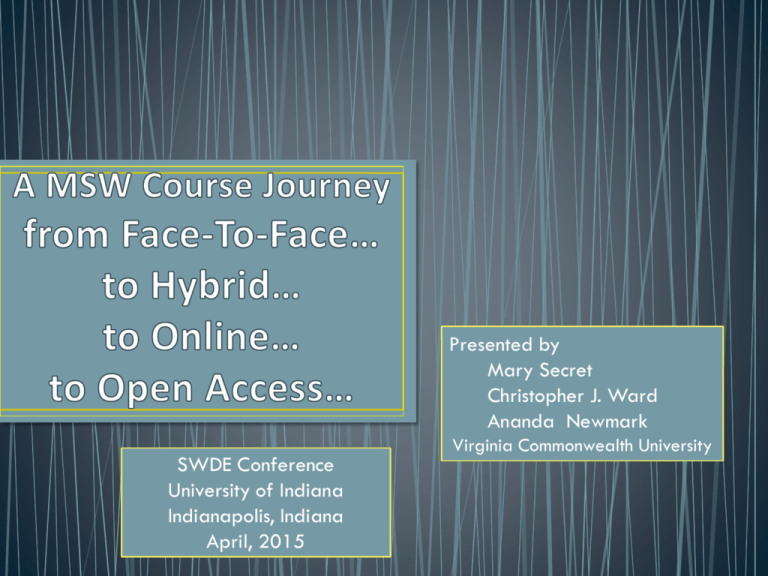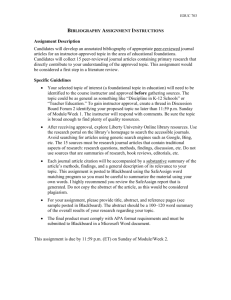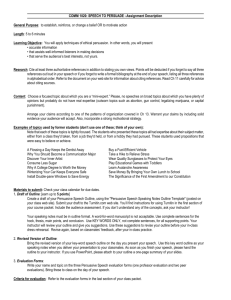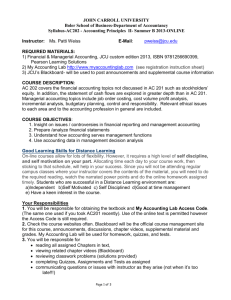115a TL A MSW course journey from face-to-face
advertisement

Presented by Mary Secret Christopher J. Ward Ananda Newmark SWDE Conference University of Indiana Indianapolis, Indiana April, 2015 Virginia Commonwealth University SCHOOL OF SOCIAL WORK VIRGINIA COMMONWEALTH UNIVERSITY Foundations of Social Research SLWK 609-901 Spring, 2013 CABEL B-042 Day/Time: W 4-6:40 Dr. Mary Secret Office Address: 212 Raleigh Building Office Hours: by appointment Office Telephone: 804-828-2379 email: mcsecret@vcu.edu COURSE DESCRIPTION 3 credits. Prerequisites: none. Introduces the methods of social work research, including problem formulation, research designs, measurement, data collection, and sampling. Focuses on the application of critical thinking skills and research methods to clinical social work practice effectiveness research, the evaluation of social work programs and services, and developing the knowledge base for social work practice. LEARNING UNITS … …… COURSE COMPETENCIES AND PRATICE BEHAVIORS (P.B.)….. THOSE WERE THE DAYS REQUIRED TEXTS Engel, R.J., & Schutt, R.K., (2013). The practice of research in social work (3rd Ed). Thousand Oaks, CA: Sage. Corcoran, J. & Secret, M. (2013). Social Work Research Skills Workbook. New York: Oxford. COURSE FORMAT The in-class activities will include instructor summary and clarification of the chapter readings, inclass exercises and small group work. It is important that you read the required material prior to coming to class because lectures will not reiterate this material. Rather, we will discuss this material as a class and then you will work in small groups of 2 or 3 to discuss specific questions to clarify and reinforce important research knowledge. You will also have some class time to work on your group research proposal, one of the required assignments in this course. Your out-of-class preparation will consist of the following major activities: 1) required reading for the class session as noted on course topic outline below; 2) download and bring to class the class power point; 3) work on your research proposal that is due at the end of the semester; 3) preparation for in-class proposal team work; 4) study for exams. Please be sure to access the Student Study Guide for available with the Engel and Schutt text in order Context Teaching Priorities and Practices: Making the Implicit Explicit Class Activities /Assignments Conversion Overview Closer look at Choices made A Conversion Matrix Context: The Course SLWK 609 Foundations of Social Work Research Course Description Introduces the methods of social work research, including problem formulation, research designs, measurement, data collection and sampling. Focuses on the application of critical thinking skills, diversity and research methods of clinical social work practice effectiveness. Covers evaluation of social work programs and services. • First course in a sequence of 3 research courses • SW students typically ‘under-excited’ by research courses • Wide variation in prior exposure to research terminology and methods • 11th hour decision for this research methods course .... (Lifestyle issue (childcare) • Have done HBSE online for years.. Have taught research online for years.. • I can do this!! • ? Will you do the Research in the SSW DE program ?? • I’VE ALREADY DONE THIS COURSE HYBRID.. WILL BE EASY TO MOVE IT TO FULL ONLINE… • • ?? Will you work with us to create an Open Access course to incorporate teaching priorities of four different disciplines -- Sociology, Public Administration, Education, Social Work ??? • I’VE ALREADY DONE THIS COURSE HYBRID.. • WILL BE EASY TO MOVE IT TO FULL ONLINE… Faculty Learning Community beginning in November, 2014 to plan Teaching Priorities and Practices • Forced thinking about the most critical features of this course that have to be present in any format, face to face or online • Recognized Teaching and learning as two interwoven but DIFFERENT activities • Course-specific teaching priorities and practices AKA what an instructor does to facilitate student learning. These 5 teaching priorities. Remained the same 1.Need to help students identify the essential from the less the evolution… essential content… try notthroughout to get too lost in the weeds!! and strengths were brought forward of to 2.Ability to assess learning and weaknesses other disciplines students -- on-going colleagues based on thein‘building blocks’ nature of the course… yes, itin is cumulative!! the open access. 3.Need for interactive component for engaged learning… try not to fall asleep!! 4.Need to guide/focus student learning at the application level of course content via research proposal… yes, research can be connected to practice!!! 5.Test for ‘walking knowledge’ … yes, you need to remember what you learn! FACE TO FACE Introd uctory Com ments The in-class activities will include instructor summary and clarification of the chapter readings, inclass exercises and small group work. HYBRID Move through the material by completing various course activities online while the instructor guides your progress: We will discuss this material as a class and then you will work in small groups of 2 or 3 to discuss specific questions to clarify and reinforce important research knowledge. You will also have some class time to work on your group research proposal, one of the required assignments in this course with regular video screencasts by responding to and commenting on your weekly activities on a regular basis (at least weekly) through various Blackboard interactive tools. Full Online (Summer) Connected Learning The course uses an interdisciplinary Your learning comes format, offered through Sociology from your completion of (SOCY 601), Education (EDUS 660), the various online Social Work (SLWK 609), and Public course activities listed Administration (PADM, CRJS, GVPA below while the 623). instructors guide your progress Collaborative discussions regarding ethics, approval processes, and other with regular video considerations of research design. screencast a by responding to Using self-reflection in the form of and commenting regular blogs, on your bi-weekly activities on a Students will co-learn with each regular basis other through various Blackboard Open, connected, networked online interactive tools. course. FACE TO FACE HYBRID In-Class instructor summary and clarification of the chapter readings, In-Class Orientation to the course and introduction to the required online in-class exercises and small group work for clarification and knowledge reinforcement. Class Structure and Activities class time to work on group research proposal/consultation from instructor mid-term ::::::::::::::::::::::::::::::::::::::::::::::: Out-of-class Required reading for the class session Work on research proposal Preparation for in-class proposal team work; take home final – hand deliver to instructor Full Online (Summer) In-class None ::::::::::::::::::::::::::::::::::::::::::::::: On-line Required reading text and mid-term administered in face additional material. to face class :::::::::::::::::::::::::::::::::::::::::::::::::: Out-of-class Required reading text and additional material Viewing video or screencast posted in Blackboard Completing the electronic chapter quizzes as noted on the course outline. Responding to journal assignments about the course material posted in Blackboard; Completing group proposal worksheets on the Blackboard WIKI site take home final – hand delivered to instructor Viewing video or screencast posted in Blackboard Completing the electronic chapter quizzes as noted on the course outline. Responding to Journal assignments about the course material that will be posted in Blackboard; instructor interaction Completing group proposal worksheets on the Blackboard WIKI site Mid-term – online RespondusLockDown Browser –2hr time limited take home final – online Respondus LockDown Brower -- 1 week Connected Learning In-Class None :::::::::::::::::::::::::::::::::::::::::: On-Line Required reading text and additional material. Viewing video or screencast posted in Blackboard Self-assessment quizzes are online through website. Weekly Blog OPEN ACCESS reflecting on the concepts being studied during the last week; instructor AND student interaction Completing group proposal worksheets on the OPEN ACCESS – Google Docs and Google Hang-out Mid-term – online RespondusLockDown Browser- 2h time limited take home final – online Respondus LockDown Brower -- 1 week FACE TO FACE Assign ments HYBRID Assignment Percent of Grade CITI EXAM 5% Mid-term – In Class 20 % Research Proposal 35% 15% group grade; 10% individual grade 10% group grade for class presentation; Assignment Grade CITI EXAM Mid-term – In Class Percent of % Research Proposal 30% 15% group grade; 10% individual grade 5% group grade for class presentation; Final Exam Take Home 30% Class Participation 10% Final Exam – Take Home Class Participation 5% 20 30% 15% Full Online (Summer) Connected Learning Assignment Percent of Grade CITI EXAM 5% Mid-term 20% Research Proposal 30% 20% group grade; 10% individual grade 5% group grade for class presentation; CITI = Final Exam – Take Home 30% Class Participation 15% 5% Mid term = 20% Research proposal = 35% (25% group grade; 10% individual grade) Final = 20% Class participation Blog = 10% (1 pt per weekly blog) Quizzes = 10% (1 pt per weekly if 80%) A Closer Look 1. Help students distinguish the essential from the less essential content.. FROM in-class power points TO >>> video screencasts/podcasts + can work from existing powerpoints + many available online - Difficult to duplicate interactive nature of in-class power points - Need to adjust for time factor.. When in the course the podcasts are issued (before or after reading online journals) 2.Assess learning strengths and weaknesses of students on on-going basis FROM taking the temperature of the class via in person discussion >>> TO online journals re online quizzes and exercises, blogs + Improvement in student learning because students HAVE to read and do the quizzes. + ? Students do self-assessment by getting perspective of self in relation to others in terms of learning FROM In-class exercises, pair share, all class discussions,An issue of time, not >>> Discussion Board CLGs; some WIKI technology exercises, BLOGS.. - Tooooo labor intensive for instructor and student in hybrid and full online + MORE MANAGEABLE IN OPEN ACCESS 4. Need to guide/focus student learning to apply course content via research proposal FROM small-group work in class with instructor consultation TO >>> group WIKIs on Blackboard and on website.. + More transparent learning… instructor ability to read exactly what groups are doing - Harder for instructor to communicate what Plan to use is needed Collaborate.. Webconferencing 5. Test for ‘walking knowledge’ FROM In class exam TO >>> in-class exam .. Or online exam RESPONDUSLOCK DOWN BROWSER BIGGEST CHALLENGE TO DATE.. - Problematic in total online courses re proctoring exams - Always possibility of cheating and copying exam - returning and reviewing exam + only option to date Putting it all together into a learning matrix




